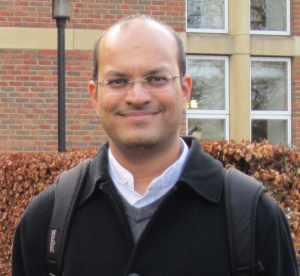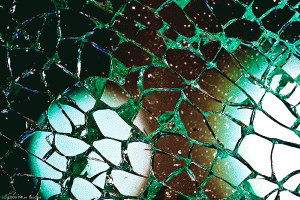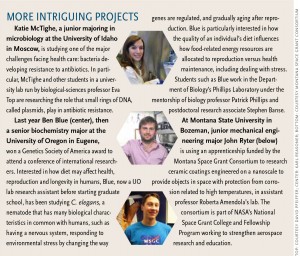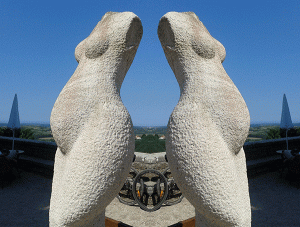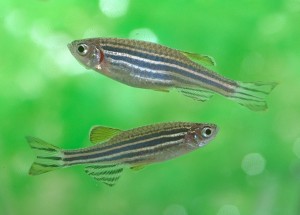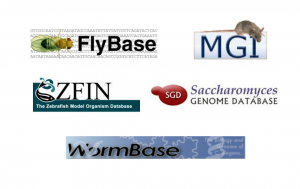Enter your address to receive notifications about new posts to your email.
Articles tagged Model Organisms
(72 results)
-
New Faculty Profile: Santhosh Girirajan
New Faculty Profiles showcase GSA members who are establishing their first independent labs. If you’d like to be considered for a profile, please complete this form on the GSA website. Santhosh Girirajan Assistant Professor (since 2012) Department of Biochemistry and Molecular Biology Department of Anthropology The Pennsylvania State University Lab website Twitter: @GirirajanLab Research program:…
-
Shattered and Shifted: Complex genomic rearrangement in C. elegans
Chromosomes can shatter. In a single, catastrophic rearrangement event, tens to hundreds of breakpoints are repaired imperfectly and result in a shuffling of genetic material. One such event affects insulin signaling and dauer formation in C. elegans, as reported in this month’s G3. Chromosome shattering, or chromothripsis, is a recently described phenomenon found in some…
-
What doesn’t kill you makes your offspring stronger
When a C. elegans nematode starves early in its life cycle, its offspring are more resistant to starvation in the next generation; however, this life-saving inheritance comes at a fitness cost for the worm itself, reveals research published in GENETICS. Jobson et al. investigate the idea that lean experiences during early development cause organisms to…
-
Behind the Podium: Amita Sehgal, Keynote Speaker at TAGC
In preparation for The Allied Genetics Conference (TAGC), set to take place in Orlando this July, Genes to Genomes is getting the inside scoop from many of the outstanding keynote speakers in our “Behind the Podium” series. In the first of a series of interviews, GSA graduate member Elisabeth Bauerly catches up with Drosophila researcher…
-
Policy Points: from the farm to the moon
Following the much appreciated budget increases for scientific agencies in December, science and health advocates alike were ecstatic at the mention of a “cancer moonshot” in President Obama’s final State of the Union Address to the House of Representatives. It is reported that the White House plans to request $755 million for cancer research funding as…
-
GSA undergrad member featured in Alaska Airlines magazine
GSA undergraduate member Ben Blue was featured in the January 2016 issue of Alaska Airlines’ Alaska Beyond | Horizon Edition Magazine. As part of an article on college students conducting research that may make a difference in the world, the magazine highlighted Ben’s research on how diet affects health. Working in the lab of Patrick Phillips at the…
-
Examining gene expression in the maternal brain
Expectant mothers undergo vast physiological changes during pregnancy and in the months following the birth of their children. In humans, fat and total body water increase; plasma protein concentrations decrease; and blood volume, cardiac output, and blood flow to the kidneys increase. We know that these processes are controlled by the central nervous system. What…
-
If it isn’t fresh, it isn’t zebrafish
A radio ad for the seafood restaurant chain Legal Sea Foods highlights the importance of zebrafish. The restaurant’s CEO, Roger Berkowitz, calls the zebrafish his favorite fish because, “unlike the lazy boring perch, you’re important in genetic research.” The ad goes on to highlight the work of zebrafish researcher Dr. Leonard Zon at Boston…
-
An uncertain future for biological databases
An article in the most recent issue of Science highlights a growing concern about the continued support of the biological databases on which our community depends. Indeed, 2015 GSA President Jasper Rine was quoted as saying these resources are “critical for our daily life as geneticists and biomedical researchers.” Many of the model organism databases (MODs) used…
-
Make Me a Match: biomedical networking for rare disease gene discovery
A Canadian network focused on rare diseases is playing matchmaker between clinicians and model organism researchers. Over half of children with rare, inherited monogenic diseases lack a molecular diagnosis. There are an estimated 7,000 monogenic diseases possible, and only about half of those have been implicated in human disease. The Rare Diseases: Models & Mechanisms…
-
Working through the issues: Science, ethics and governance of gene drive research
The Committee on Gene Drive Research in Non-Human Organisms convened by National Academies of Sciences, Engineering, and Medicine held an information gathering meeting on October 28, 2015, to consider the Science, Ethics and Governance Considerations for Gene Drive Research. This meeting comes as a component of a large Gene Drive study, which is set to review the…


